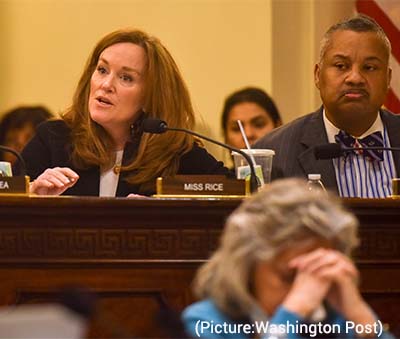As the spike in coronavirus cases caused by the omicron variant wanes, some experts say it is time to start lifting more restrictions, setting up a heated debate, particularly over mask mandates in schools.
People are exhausted with the pandemic after roughly two years, and health advocates warn that pandemic rules cannot last forever.
“We cannot remain in a perpetual state of emergency,” said Leana Wen, a public health professor at George Washington University. “People burn out.”
Many aspects of life have already returned to something like normal. Bars and restaurants are open and packed across the country, and countless travel restrictions have been lifted.
But some locations, including New York and Washington, D.C., still have mask mandates for the general public, and in schools, mask requirements are more common.
Vaccinations remain as the key source of protection. People who are vaccinated and boosted have strong protection against severe disease, even if there is still a chance they get mild illness.
Wen noted that school-age children 5 and up can now all be vaccinated.
And Pfizer last week began the application for its COVID-19 vaccine for children as young as six months.
Ashish Jha, dean of the Brown University School of Public Health, said that restrictions in general should be lifted as cases come down, but not just yet, given that cases are still high.
“I’ve been saying for weeks that as cases recede we can soon relax public health restrictions,” Jha tweeted. “I think of this like the weather. When it is bucketing rain umbrella, rain coat, boots, are all essential. When the storm turns into a drizzle, those become less critical.”
The possibility of a future variant that has greater ability to evade the vaccines’ protection, or that causes more severe disease, leads some experts to call for loosening restrictions during the coming lull to give people a respite in case they need to return later.
“If we don’t take the off-ramps, nobody will listen when we need to have an on-ramp,” tweeted Jeremy Faust, a professor at Harvard Medical School.
Cases in the U.S. have fallen significantly from the peak during the omicron wave in mid-January, from approximately 800,000 new cases per day to about 350,000 per day, which is still quite high. More experts are putting a focus on hospitalizations, which have now peaked nationally, though again are still at the high level of around 123,000 a day, according to a New York Times tracker.
Asked about people returning to more normal activities, Centers for Disease Control and Prevention (CDC) Director Rochelle Walensky on Wednesday cautioned that hospitalizations “are still quite high and [we are] certainly having hospital capacity challenges in many parts of the country still.”
“We really do have to look to our hospitalization rates and our death rates to look to when it is time to lift some of these mitigation efforts,” she said. “We will continue to reevaluate, and we know people are anxious.”
The matter of lifting restrictions has received a new burst of political attention as Republicans push to scale back measures such as mask mandates.
Virginia’s new Republican governor, Glenn Youngkin, has drawn controversy and an American Civil Liberties Union-backed lawsuit from parents over an order making masks optional in schools in the state.
Senate Minority Leader Mitch McConnell (R-Ky.) more broadly said Wednesday that “it is time for the state of emergency to wind down.”
On the Democratic side, Denver Mayor Michael Hancock this week lifted the city’s mask mandate and proof of vaccination requirement for businesses.
“This virus is something we’re going to have to manage and learn to live with,” Hancock said.
A Monmouth University poll this week found that a large majority of Americans, 70 percent, agreed that “it’s time we accept that Covid is here to stay and we just need to get on with our lives.”
Republicans continue to fight hard against President Biden’s vaccine mandates, which many public health experts have praised as a crucial way to get more people vaccinated and help return to normal.
Advocates have also been pushing the Biden administration and Congress for more funding for global vaccination efforts, which can help prevent new variants from emerging.
Some experts are pushing back against the calls for returning to normal, pointing to more vulnerable people.
“The great, white middle — stretching right and left across the political spectrum and the op-ed pages of the Times — is ready to move on,” Gregg Gonsalves, a professor at the Yale School of Public Health, wrote in The Nation. “The thing is: Those left behind don’t have the choices or the resources that those with privilege do, whether they are poor, living with disabilities or chronic medical conditions — or just too old to matter.”
Wen, a former health commissioner for the city of Baltimore, said the CDC should at least set new benchmarks for under what circumstances masks would no longer be needed.
“It’s precisely because of the threat of future variants that we need to let up on restrictions now,” she said. “I’m not trying to sound the all-clear at all … I’m saying we need to take advantage of the lull that we have coming up.”

 “We write today urging you to take legislative action as swiftly as possible to lower drug prices,” the Democrats, many of whom represent competitive seats,
“We write today urging you to take legislative action as swiftly as possible to lower drug prices,” the Democrats, many of whom represent competitive seats,